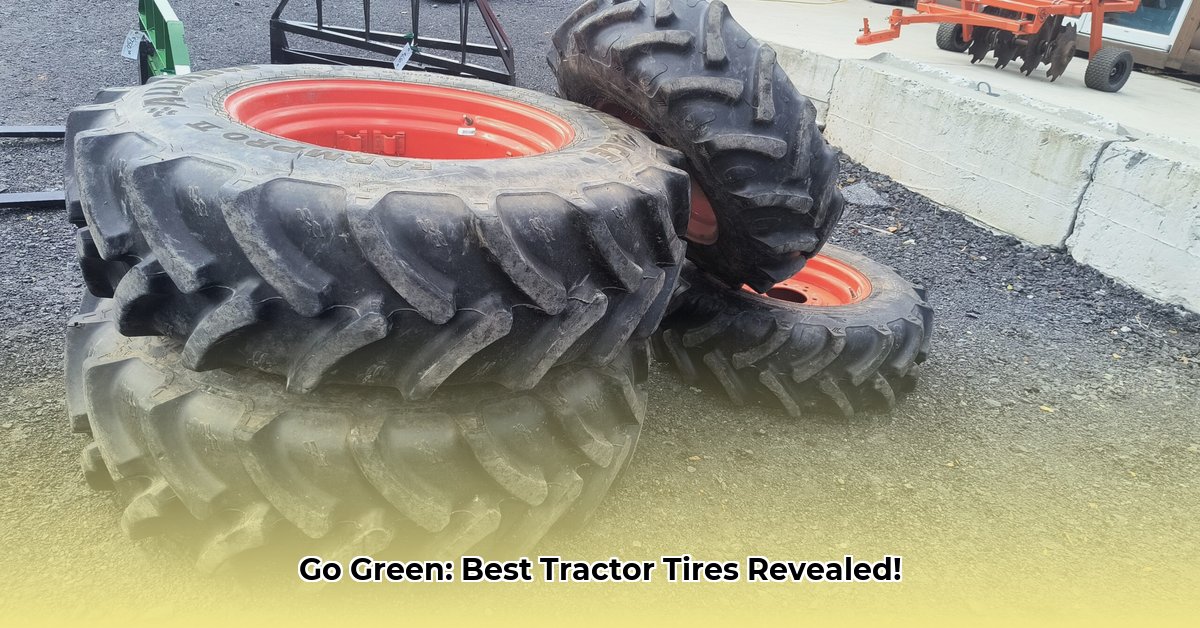
Choosing the right tractor tires significantly impacts your farm's efficiency and environmental footprint. This guide focuses on 16.9x30 tires, a popular size for larger agricultural equipment, and how to select sustainable options. For more tire size options, see this helpful resource: 16.9-26 tire info.
Understanding 16.9x30 Tractor Tires
16.9x30 tires are workhorses designed for heavy loads and demanding farm tasks. However, not all tires are created equal, particularly concerning sustainability. This section delves into key factors to help you make informed decisions.
Radial vs. Bias-Ply: A Sustainable Comparison
Two main types of 16.9x30 tires exist: radial and bias-ply. Each has distinct characteristics affecting fuel efficiency and soil compaction. Aren't these key factors in sustainable farming?
Radial Tires: Known for superior fuel efficiency due to lower rolling resistance, they minimize soil compaction, promoting long-term soil health. However, they might be less durable in extremely rocky conditions.
Bias-Ply Tires: These are more robust, offering increased puncture resistance, ideal for rugged terrains. While initially less expensive, their lower fuel efficiency and potential for increased soil compaction should be considered.
| Feature | Radial | Bias-Ply |
|---|---|---|
| Fuel Efficiency | Excellent | Fair |
| Soil Compaction | Minimized | More likely |
| Ride Comfort | Superior | Less comfortable |
| Durability | Good, but less robust in tough conditions | Excellent, especially in harsh conditions |
| Cost | Initially higher | Initially lower |
The optimal choice depends on your specific farming operations and priorities.
Choosing Sustainable 16.9x30 Tractor Tires
Sustainability is crucial for long-term farming success. Smart tire choices play a vital role.
Tire Materials: The Eco-Friendly Choice
Prioritize tires with a high percentage of recycled rubber content, reducing reliance on new materials and minimizing landfill waste. Many manufacturers are incorporating reclaimed rubber, minimizing their overall environmental impact. Look for manufacturers' sustainability reports for details.
Manufacturing Processes and Environmental Impact
Consider the manufacturer's environmental policies. Responsible companies invest in energy-efficient production and waste reduction strategies. Look for certifications or statements emphasizing commitment to minimizing their environmental footprint.
Fuel Efficiency: Reducing Your Carbon Footprint
Radial tires often provide better fuel efficiency than bias-ply tires. This directly translates into cost savings and reduced greenhouse gas emissions. Lower rolling resistance means less fuel is needed, minimizing your farm's carbon footprint. Did you know that a 10% improvement in fuel efficiency can significantly reduce your annual fuel costs?
Minimizing Soil Compaction: Protecting Your Land
Soil compaction reduces crop yields and harms long-term soil health. Proper tire pressure is crucial. Underinflation causes excessive compaction and tire wear, while overinflation can lead to tire damage. Maintaining correct inflation pressures is essential for minimizing compaction.
Extending Tire Lifespan: A Sustainable Practice
Proper tire maintenance significantly extends their lifespan, reducing the frequency of replacements and decreasing overall environmental impact.
- Regular Inspections: Check frequently for cuts, punctures, and wear. Early detection prevents major damage.
- Rotation and Balancing: Regular rotation ensures even wear. Balancing minimizes vibrations, improving handling and fuel efficiency.
Actionable Steps for Sustainable Tire Selection
- Assess your needs: Consider soil type, farming practices, and tractor specifications.
- Research tire brands: Identify manufacturers with strong sustainability commitments. Look for certifications or reports detailing recycled material usage and manufacturing practices.
- Compare tire specifications: Review rolling resistance, tread depth, and load capacity.
- Calculate total cost of ownership: Factor in initial purchase price, fuel efficiency, lifespan, and disposal costs.
- Invest in pressure monitoring systems: These systems ensure optimal inflation, enhancing fuel efficiency and tire lifespan.
Conclusion
Choosing sustainable 16.9x30 tractor tires is a vital decision with long-term implications for both your farm's profitability and the environment. By carefully considering factors like tire type, materials, and maintenance practices, you can make an informed choice that benefits your farm's success and protects the planet.